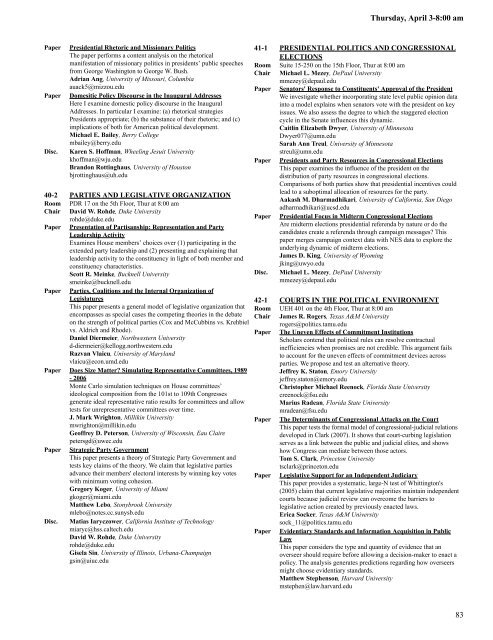2008 Conference Program - Midwest Political Science Association
2008 Conference Program - Midwest Political Science Association
2008 Conference Program - Midwest Political Science Association
Create successful ePaper yourself
Turn your PDF publications into a flip-book with our unique Google optimized e-Paper software.
Thursday, April 3-8:00 am<br />
Paper<br />
Paper<br />
Disc.<br />
Presidential Rhetoric and Missionary Politics<br />
The paper performs a content analysis on the rhetorical<br />
manifestation of missionary politics in presidents’ public speeches<br />
from George Washington to George W. Bush.<br />
Adrian Ang, University of Missouri, Columbia<br />
auack5@mizzou.edu<br />
Domesitic Policy Discourse in the Inaugural Addresses<br />
Here I examine domestic policy discourse in the Inaugural<br />
Addresses. In particular I examine: (a) rhetorical strategies<br />
Presidents appropriate; (b) the substance of their rhetoric; and (c)<br />
implications of both for American political development.<br />
Michael E. Bailey, Berry College<br />
mbailey@berry.edu<br />
Karen S. Hoffman, Wheeling Jesuit University<br />
khoffman@wju.edu<br />
Brandon Rottinghaus, University of Houston<br />
bjrottinghaus@uh.edu<br />
40-2 PARTIES AND LEGISLATIVE ORGANIZATION<br />
Room PDR 17 on the 5th Floor, Thur at 8:00 am<br />
Chair David W. Rohde, Duke University<br />
rohde@duke.edu<br />
Paper Presentation of Partisanship: Representation and Party<br />
Leadership Activity<br />
Examines House members’ choices over (1) participating in the<br />
extended party leadership and (2) presenting and explaining that<br />
leadership activity to the constituency in light of both member and<br />
constituency characteristics.<br />
Scott R. Meinke, Bucknell University<br />
smeinke@bucknell.edu<br />
Paper Parties, Coalitions and the Internal Organization of<br />
Legislatures<br />
This paper presents a general model of legislative organization that<br />
encompasses as special cases the competing theories in the debate<br />
on the strength of political parties (Cox and McCubbins vs. Krehbiel<br />
vs. Aldrich and Rhode).<br />
Daniel Diermeier, Northwestern University<br />
d-diermeier@kellogg.northwestern.edu<br />
Razvan Vlaicu, University of Maryland<br />
vlaicu@econ.umd.edu<br />
Paper Does Size Matter Simulating Representative Committees, 1989<br />
- 2006<br />
Monte Carlo simulation techniques on House committees’<br />
ideological composition from the 101st to 109th Congresses<br />
generate ideal representative ratio results for committees and allow<br />
tests for unrepresentative committees over time.<br />
J. Mark Wrighton, Millikin University<br />
mwrighton@millikin.edu<br />
Geoffrey D. Peterson, University of Wisconsin, Eau Claire<br />
petersgd@uwec.edu<br />
Paper Strategic Party Government<br />
This paper presents a theory of Strategic Party Government and<br />
tests key claims of the theory. We claim that legislative parties<br />
advance their members' electoral interests by winning key votes<br />
with minimum voting cohesion.<br />
Gregory Koger, University of Miami<br />
gkoger@miami.edu<br />
Matthew Lebo, Stonybrook University<br />
mlebo@notes.cc.sunysb.edu<br />
Disc. Matias Iaryczower, California Institute of Technology<br />
miaryc@hss.caltech.edu<br />
David W. Rohde, Duke University<br />
rohde@duke.edu<br />
Gisela Sin, University of Illinois, Urbana-Champaign<br />
gsin@uiuc.edu<br />
41-1 PRESIDENTIAL POLITICS AND CONGRESSIONAL<br />
ELECTIONS<br />
Room Suite 15-250 on the 15th Floor, Thur at 8:00 am<br />
Chair Michael L. Mezey, DePaul University<br />
mmezey@depaul.edu<br />
Paper Senators' Response to Constituents' Approval of the President<br />
We investigate whether incorporating state level public opinion data<br />
into a model explains when senators vote with the president on key<br />
issues. We also assess the degree to which the staggered election<br />
cycle in the Senate influences this dynamic.<br />
Caitlin Elizabeth Dwyer, University of Minnesota<br />
Dwyer077@umn.edu<br />
Sarah Ann Treul, University of Minnesota<br />
streul@umn.edu<br />
Paper Presidents and Party Resources in Congressional Elections<br />
This paper examines the influence of the president on the<br />
distribution of party resources in congressional elections.<br />
Comparisons of both parties show that presidential incentives could<br />
lead to a suboptimal allocation of resources for the party.<br />
Aakash M. Dharmadhikari, University of California, San Diego<br />
adharmadhikari@ucsd.edu<br />
Paper<br />
Disc.<br />
Presidential Focus in Midterm Congressional Elections<br />
Are midterm elections presidential referenda by nature or do the<br />
candidates create a referenda through campaign messages This<br />
paper merges campaign context data with NES data to explore the<br />
underlying dynamic of midterm elections.<br />
James D. King, University of Wyoming<br />
jking@uwyo.edu<br />
Michael L. Mezey, DePaul University<br />
mmezey@depaul.edu<br />
42-1 COURTS IN THE POLITICAL ENVIRONMENT<br />
Room UEH 401 on the 4th Floor, Thur at 8:00 am<br />
Chair James R. Rogers, Texas A&M University<br />
rogers@politics.tamu.edu<br />
Paper The Uneven Effects of Commitment Institutions<br />
Scholars contend that political rules can resolve contractual<br />
inefficiencies when promises are not credible. This argument fails<br />
to account for the uneven effects of commitment devices across<br />
parties. We propose and test an alternative theory.<br />
Jeffrey K. Staton, Emory University<br />
jeffrey.staton@emory.edu<br />
Christopher Michael Reenock, Florida State University<br />
creenock@fsu.edu<br />
Marius Radean, Florida State University<br />
mradean@fsu.edu<br />
Paper<br />
Paper<br />
Paper<br />
The Determinants of Congressional Attacks on the Court<br />
This paper tests the formal model of congressional-judicial relations<br />
developed in Clark (2007). It shows that court-curbing legislation<br />
serves as a link between the public and judicial elites, and shows<br />
how Congress can mediate between those actors.<br />
Tom S. Clark, Princeton University<br />
tsclark@princeton.edu<br />
Legislative Support for an Independent Judiciary<br />
This paper provides a systematic, large-N test of Whittington's<br />
(2005) claim that current legislative majorities maintain independent<br />
courts because judicial review can overcome the barriers to<br />
legislative action created by previously enacted laws.<br />
Erica Socker, Texas A&M University<br />
sock_11@politics.tamu.edu<br />
Evidentiary Standards and Information Acquisition in Public<br />
Law<br />
This paper considers the type and quantity of evidence that an<br />
overseer should require before allowing a decision-maker to enact a<br />
policy. The analysis generates predictions regarding how overseers<br />
might choose evidentiary standards.<br />
Matthew Stephenson, Harvard University<br />
mstephen@law.harvard.edu<br />
83










